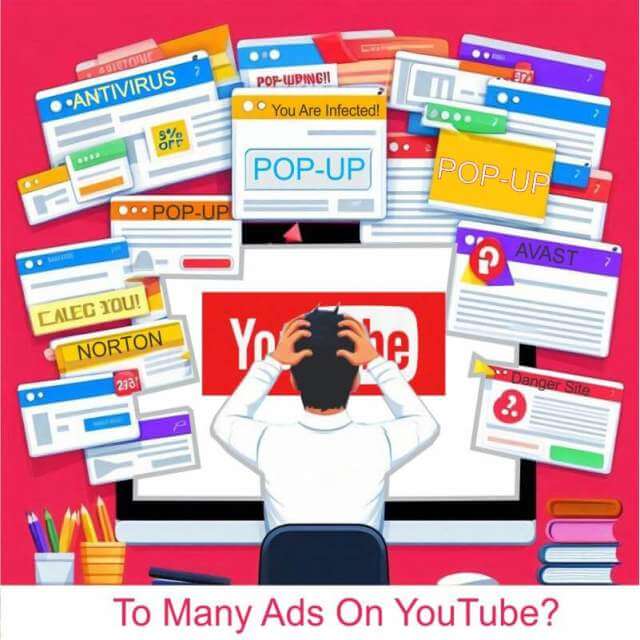Should You Block Ads On Websites?
Most online services rely heavily on revenue from advertising to keep their site profitable. But to me, I have always viewed it as a two-way street. I am willing to sit through ads on a site that provides me with beneficial material. Without trying to sound like a promo, consider www.davescomputertips.com, a website I write for that provides seriously beneficial content to its readers. Its Newsletter and Help Forum are free and you do not have to subscribe to read content created by its writers whose income from writing articles comes solely from the ad revenue and the occasional voluntary donation from some of its generous subscribers.
On The Soapbox
They do ask that you don’t block their ads only because most of the contributors like to get paid a little for their efforts. In addition, on sites like Dave’s (and there are others), making money is not the driving force of their willingness to research and provide users with meaningful content. Outside of charging for membership or being supported by donations from people who appreciate the content they are being offered, advertising is the only other form of revenue. So I would never block the ad content from beneficial sites. Of course, it is up to you to determine if there is value in any website or donation-based software. My apologies for that “soap-box” paragraph but I wanted to explain why we as readers should consider the consequences of blocking ads. On the other hand…
YouTube And Others
Large highly commercial sites like YouTube and others receive large revenue streams from sources other than ads yet they, in my opinion, cross the line too often. YouTube is a perfect example; it made about $11 billion in subscription services alone in 2022. In addition, they take a 30% cut of the earnings from Channel Memberships. But why stop at $11 billion? Just in 2023, they earned $31.5 billion in ad revenue. I am a fully invested member of capitalism but there is a fine line between earnings and gluttony. In 2020, YouTube ads earned $19.77 billion and in only two years it jumped an additional $10 billion and continues to grow annually. In the first quarter of 2024, they have earned $8.1 billion.
Some of that is merely the natural growth of viewers but much is simply increasing the number of ads that viewers must sit through. That is why I never feel bad about blocking ads on these kinds of websites. Also, blocking ads on sites like YouTube is hard. They have very sophisticated software that prevents most ad blockers from working but there are exceptions.
Before presenting you with Ad blockers that are fairly successful on YouTube, I would like to mention that the points I tried to make earlier apply to many of the content creators, particularly those with less than 100,000 viewers. A site with 80K viewers might seem like big earners but their ad revenue might earn between $20 to $320 from YouTube. Most rely on sponsorships, product sales, and Super Chats during live streams. If you value their work, think about supporting them.
My Favorite YouTube Ad Blockers
- Adblock for YouTube: Because it was developed to specifically block YouTube ads it does a good job of blocking banner ads, video ads, and pop-ups
- Brave Browser: Brave is very good at blocking ads on YouTube and no extensions are required. Simply by opening YouTube, it shows the number of ads blocked
- uBlock Origin: The benefit of uBlock is it gives you the ability to customize filters to block ads
- Total Adblock: Effective
- Ghostery: A very effective ad blocker. It does have a nice user-friendly interface and the Ghostery browser is an additional benefit. You may contribute if you feel it to be worthy software
Summary
None of these are 100% foolproof but I have found that “Adblock for YouTube” and “Brave Browser” are very effective and have spent more time with them so there may be some bias there. I liked Ghostery but at the time it offered a premium version that I don’t think is available anymore and it continually provided pop-ups to upgrade.
I love YouTube and no one can deny its ability to help you in hundreds of ways. From changing your transmission, baking bread, or creating a website. That is why I donate to several of the sites I subscribe to. Anyone willing to show me how to wire my Android Car Play and backup camera on my 24-year-old Mercury deserves something.
—

Jim, I have not tried all of the YouTube ad blockers you mention, but at least one (I think it was Ad Block for YouTube) just blacked out the screen for the duration, but did not skip past the time window.
The good news is that I always use the Brave browser. Some time back, YouTube twigged to Brave’s shields and got cranky. You inspired me to try those shields again, and hallelujah! It works now. I just experimented with ten videos in a row. When my shields were down, the video opened with an ad. Every. Single. Time. With shields up, the same videos opened straight to content and nary an ad was to be seen for the length of the video. So hey, folks. Don’t bother with those extensions. Download Brave and be done with it.
You are spot on. When I plan to view several videos on YouTube I switch to Brave exclusively. Thanks for the comment
Well, as my father used to say “Dog my cats!” It didn’t take Google long to twig to this hack. I’ve enjoyed a couple of months of ad-free viewing. The free ride ended today with a blocking screen informing me that ad-free viewing requires subscribing to YouTube Premium or whatever it is. It was nice while it lasted!
Season Greetings GrannyGeek. Have you tried downloading the videos to see if the ads were also included? Could you post a link of the latest blocked video. Would like to try my luck, Mindblower!
To my surprise, today the blocker is gone. When and if it reappears, I’ll post a screenshot.
Hey GrannyGeek, you may be interested in reading https://davescomputertips.com/how-to-mitigate-youtubes-ad-blocking-detection-w-brave/
I am sort of in the same position as you Jim. Those who provide useful information on YouTube should be compensated. But by clicking to that subscribe button, do they not receive some financial reward? Am I wrong in believing that using Ad Blockers hinder their rewards? I use the AdGuard AdBlocker extension with Firefox and can select which content is blocked. DCT is not blocked as I know the writers here deserve to be compensated for their excellent work, Mindblower!
Mindblower, subscribing and liking increase their ad revenue overall. While you can block some youtube overall, subscribing to the posters you like helps them individually. Once I subscribe I know it has helped a little but if I find myself visiting the site often I often donate a small amount to ensure they can continue to produce videos. An example is WebYoda. They make their money by pitching hosting sites, software, etc. but they offer so much information for a website creator like me I gladly donate. Thanks for the comment.
I don’t mind adds until they interrupt what I am trying to read, like this site. The adds are right in your face, sometimes trying to trick you into clicking their link. You know they are up to no good. Put the adds on the side and SELL your product, don’t be trying to trick the viewer. A good add sells itself.
Many times if I am reading a good article, I will use reader view or reader mode, depending on the browser because the adds are SO invasive I have a hard time reading the article.
As for add-blockers, I do not understand why someone has come up with an add-blocker that lets the adds download but not display them in a manner that the website thinks their adds are being viewed, but are hidden.
Hi Tom. Re-read my previous reply. It might be the solution you are seeking, Mindblower!
Yeah Tom, it can be a real hassle when ads interrupt the flow. It often boils down to the priorities of the site owners. Some prioritize revenue over user experience, pushing for more intrusive ad placements. Others balance better, placing ads where they don’t disrupt the content. It’s a dance between making money and keeping visitors happy. Some larger sites with a lot of visitors that use intrusive ads are only in it for the money. However, some leeway should be made for smaller sites with fewer visitors. Intrusive ads may be the only way to keep the site going and serving the public. As I said it is a balancing act with Google’s AdSense having a lot to say about the number of ads. I would prefer a larger number of ads if kept out of the middle of an article. I also believe websites that have in article ads should look closely at how their ads are displayed on mobile devices. I refuse to visit sites that do not take it into consideration. DCT applies reader friendly ad placement on mobile devices with most ads appearing on the top and bottom of a page. Thanks for the comment.
I’d also like to add that I’ve seen YouTubers complaining that YouTube keep changing stuff.
For example YouTubers can tell where they want add breaks to go, the idea being that they can put it somewhere that won’t be too out of place, ruin the flow etc. But some have found it doesn’t go where they tell it to.
I’m all for adverts, but they seem to be getting longer with less chances to skip. Funny thing is people moved to streaming to avoid adverts.